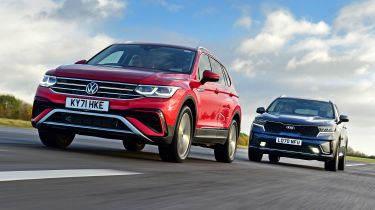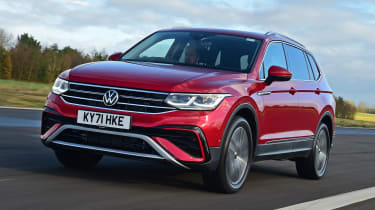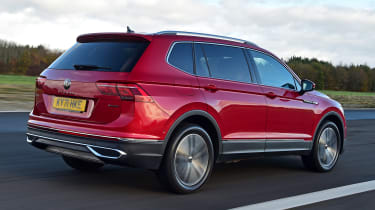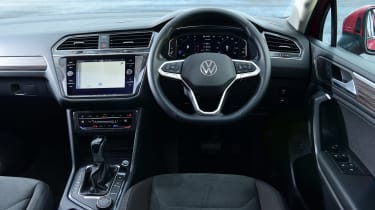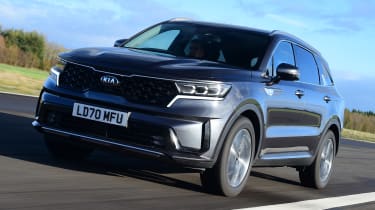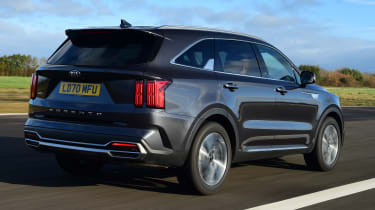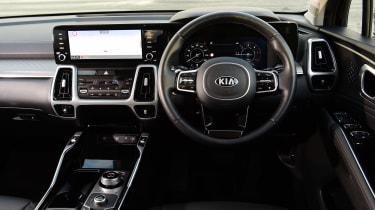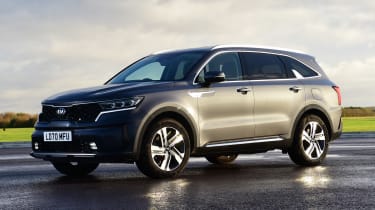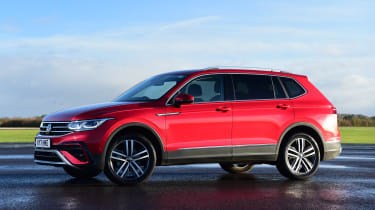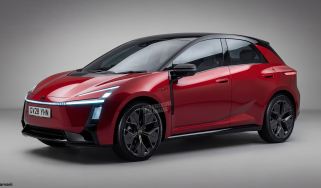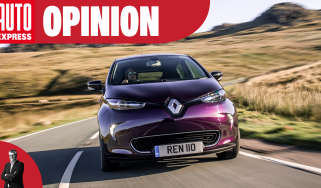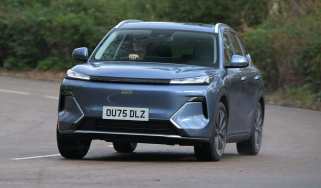Volkswagen Tiguan Allspace vs Kia Sorento: 2022 twin test review
The family-friendly Volkswagen Tiguan Allspace and Kia Sorento seven-seat SUVs show off their versatility, but which is better? We find out…
While the popularity of SUVs continues unabated, in a lot of cases these taller, more imposing vehicles offer little in the way of extra practicality when compared with a conventional hatchback or a large estate.
Many people like the raised driving position and better access that an SUV-style body provides, but another key benefit is the ability to squeeze in an extra pair of seats. Seven-seat SUVs are a distinct class in themselves, something that is hugely desirable – and often necessary – for big families.
One of the most popular examples has been the Volkswagen Tiguan Allspace. It’s just been treated to a mid-life facelift, which has brought with it both styling and tech upgrades. To find out just how far-reaching those updates really are, we’ve lined up the VW against one of the cars it must beat if it wants to compete for class honours. The Kia Sorento is reasonably new on the block, too, with this fourth-generation model having made its debut in 2020.
But which comes out on top? Are those extra seats really worthwhile, and does the additional space come at the expense of manoeuvrability in these cars’ usual tight urban habitats?
Volkswagen Tiguan Allspace
| Model: | VW Tiguan Allspace 2.0 TDI 4MOTION Elegance |
| Price: | £43,135 |
| Engine: | 2.0-litre 4cyl turbo, 148bhp |
| 0-62mph: | 9.7 seconds |
| Test economy: | 41.9mpg/9.2mpl |
| CO2: | 173g/km |
| Annual road tax: | £520 |
We’re testing the revised Tiguan Allspace here in mid-spec Elegance trim. Before options, this 2.0 TDI 4MOTION model costs £43,113, although the extras fitted to this car, which include a tow bar, a trailer assist system that helps with parking while towing, tyre-pressure monitors and ‘Kings Red’ metallic paint, bump that number to £45,170.
Used - available now

2023 Ford
Fiesta
21,720 milesAutomaticPetrol1.0L
Cash £14,197
2026 Audi
A1 Sportback
11,380 milesManualPetrol1.0L
Cash £17,100
2024 BMW
3 Series
41,020 milesAutomaticPetrol2.0L
Cash £25,500
2022 Volkswagen
Golf
38,583 milesAutomaticPetrol1.5L
Cash £20,000Design & engineering
The mid-life updates to the Tiguan are subtle, and while all of them were no doubt intended to improve the car, some updates have worked better than others. The changes start at the front, where a new face features slimmer, sharper headlights that, on this Elegance trim, feature advanced LED matrix technology. Those lights neatly integrate into the wide front grille, but elsewhere, the look remains the same.
While buyers will no doubt welcome the brighter lights, which are smart enough to avoid dazzling oncoming traffic, we reckon some of the changes inside have been less successful. The introductions of USB-C connections and wireless smartphone charging are great, but the move towards touch-sensitive keys isn’t so pleasing. The ones on the redesigned steering wheel work fine, but those for the climate controls are far more fiddly to use than the round dials and proper buttons they’ve replaced. It’s a step backwards.
Otherwise, the Tiguan’s cabin is largely similar to before. The overall design looks a little plain beside the Kia, although some might be fine with that and consider the Sorento’s cabin borderline chintzy. There’s little to separate the two in terms of perceived build quality; both are above average in this part of the market in that regard.
The Tiguan Allspace is offered with a choice of two petrol and two diesel engines. The 1.5-litre and 2.0-litre TSI petrol units produce 148bhp and 187bhp respectively, but the torquey diesel units are better suited to this type of car. The range is topped by a 197bhp 2.0-litre TDI with 400Nm of torque, but here we’re driving the less potent version with 148bhp and 360Nm. This is only available with a seven-speed dual-clutch gearbox, but with a choice of front or four-wheel drive (we’re testing the latter here, which caries a £2,000 premium over the front-driven version). The Kia is four-wheel drive only.
Driving
Based on our experience of this 148bhp diesel, we doubt that many people would get much benefit from opting for the more powerful TDI unit. This version hauls the Allspace along just fine; performance is decent and the engine is refined for the most part.
It’s let down somewhat by the automatic gearbox, though; the transmission is slow to react when moving away from a standstill or very low speeds, which means that there’s a risk of being left floundering when pulling out of a junction in a hurry.
Officially, the VW weighs 120kg less than the Kia, and that’s quite noticeable through the corners. The Tiguan turns in more keenly, and feels a little more compact on the road. It helps that the steering is quite light, too. At higher speeds and over longer-frequency bumps, the VW feels softer and more comfortable, but at lower speeds over potholes and speed bumps, shocks are transmitted into the cabin more harshly.
Practicality
Very few seven-seaters offer much boot space when all the chairs are occupied, but with 230 litres, the Tiguan Allspace beats the Sorento’s 187 litres. Fold the back seats (a quick and easy process, once the headrests are dropped down) and that space grows to 700 litres. Again, that’s more than the Kia’s 616-litre capacity.
However, while the Sorento’s boot has a square shape and a flat floor that makes loading easy, the Tiguan’s features a slightly awkward step at its entrance, and little humps where the seats fold down. The VW’s loading floor itself is quite high, too.
The central row slides back and forth, so you can choose between kneeroom or boot space in five-seat mode, or give extra room to fit an extra pair of people in the back. With the middle row all the way forward, however, it makes things very tight – something that doesn’t seem like a worthwhile compromise for anyone when the third-row seats still feel cramped for both head and kneeroom.
Ownership
Euro NCAP hasn’t tested the seven-seat Tiguan Allspace, but the five-seat model’s five-star rating, which it earned in 2016, applies here. This includes an impressive 96 per cent score in the adult occupant protection category.
The Sorento was tested to more recent 2020 standards, and it also scored five stars. Thanks to a long list of standard safety kit that includes driver attention warning, a forward collision avoidance assist that recognises pedestrians and cyclists, lane-follow assist, and a trailer stability system (a feature that’s optional on the VW), the Sorento scored 87 per cent in the safety assist category.
Running costs
At the pumps, the VW proved to be the cheaper to run of this pairing. During our time, we achieved 41.9mpg, not far off VW’s official WLTP-certified 42.8mpg rating, and 7mpg better than we achieved in the Sorento. Over the course of 20,000 miles, that’s the difference between paying £3,852 to fill the VW compared with £4,624 to fill the Kia.
Both of these cars sit in the highest 37 per cent Benefit-in-Kind tax band, and both prove to be very expensive for company car users a result. A higher-rate income tax earner should expect to front up a whopping £6,236 per year to run the Tiguan Allspace, or a nominal £17 less for the Sorento.
Testers’ notes: “Possibly the most gimmicky option for the Tiguan are the self-levelling wheel centre caps, so the VW logo always stays the right way up. Yours for £115.”
Kia Sorento
| Model: | Kia Sorento 2.2D auto 3 |
| Price: | £43,020 |
| Engine: | 2.2-litre 4cyl turbo, 199bhp |
| 0-62mph: | 9.1 seconds |
| Test economy: | 34.9mpg/7.7mpl |
| CO2: | 176g/km |
| Annual road tax: | £520 |
If you want a diesel Sorento, then there’s only one trim level to choose from: the mid-range 3. There’s little scope for adding options, either; it’s priced at £43,020, and the only extra available is metallic paint, which adds £660 to that figure.
Design & engineering
Styling is subjective, but what does seem clear is that the Volkswagen Tiguan Allspace is likely to appeal to those who prefer a more understated appearance, while the Kia Sorento takes a bolder approach. The Korean company has been more adventurous with its detailing – take the imposing grille up front and twin vertical strip tail-lights as examples – but the overall shape also looks more imposing and chunky beside the Tiguan, which almost looks sleek in comparison.
The same goes for the cabin, where Kia’s designers have made a much more prominent feature out of the air vents, while the high and wide centre console makes you feel like you’re sitting in a much larger SUV than the VW, even though there isn’t a vast difference between them in terms of exterior dimensions.
Overall there’s not much to separate these two for build or material quality. But it’s the little things, such as VW’s decision to line the door pockets with a felt-like material to stop items rattling about, that show where the German brand has paid a little more attention to detail.
However, the Kia’s ergonomics are better, especially for the air-conditioning controls. While there are some touch-sensitive keys for the fan speed and direction, they’re both much larger and placed higher on the dashboard than the Tiguan’s arrangement. The temperature for both driver and passenger sides are physical rocker keys, too, so as long as you leave the system in Auto mode, a simple nudge of these switches can keep you comfy without needing to divert your gaze from the road.
While electrification now forms the bulk of the Sorento range, there’s still a regular diesel workhorse to be found in the line-up, too. The 2.2-litre unit is a development of the CRDi powerplant used in the previous-generation Sorento. With 199bhp and 440Nm, it has 51bhp and 80Nm more than the Tiguan Allspace’s 2.0 TDI, but the Sorento is also 110kg heavier, so it needs the extra power.
Driving
While the Sorento’s diesel is a larger-capacity unit than the Tiguan’s, it also feels less sophisticated. At idle it sounds clattery, and more vibrations reach the cabin – although admittedly it’s not a huge difference.
That extra power isn’t particularly telling on the road, either; in fact, there’s precious little to separate these two in terms of performance. On paper, the Kia covers the 0-62mph benchmark in 9.1 seconds, which is 0.6 seconds quicker than the Tiguan. But the gap feels closer than that driving out in the real world.
While the Kia’s steering feels a little slower and a touch heavier than the VW’s, it’s more precise. So despite the extra weight and more sluggish responses, it actually feels just as reassuring to weave along a twisty road. There’s little between these two cars in terms of wind and road noise on a motorway, with both feeling quiet and refined.
Practicality
We’ve established that the Tiguan is marginally the better option in terms of boot space, but the Sorento is definitely the more accommodating of the two for people.
That’s certainly the case in the third row, and it’s something you notice even when climbing in. The Kia’s door openings are larger and the middle row moves further forward, so it’s much easier to get into the rearmost row. Once there, the seats feel more like permanent fixtures; there’s more space than in the child-sized temporary seats found in the VW. To offer decent kneeroom in the Tiguan, you need to slide the middle row forwards to the point that the people sitting there will also start to feel squashed.
Left in five-seat mode, the Sorento is more comfortable, too. Head and kneeroom are better than in its rival, and where the Tiguan has a large central hump in the floor, which forces the middle- seat occupant to fight for foot space with the outer passengers, the Kia’s floor is much flatter and lower.
Both of these cars are great candidates for those who want to tow a caravan or a trailer. Officially, both boast a 2.5-tonne braked trailer limit, although thanks to its extra torque, we’d recommend the Kia if you’ll frequently be hauling heavy loads.
Ownership
Based on the results of our most recent Driver Power satisfaction survey, the Kia Sorento should be significantly more satisfying to own than its rival here.
As a manufacturer, the Korean brand finished second only to Porsche (out of 29 entries), while out of 21 dealer networks surveyed, it took third, this time behind Porsche and Lexus.
VW, on the other hand, didn’t impress so much. It took 17th in the manufacturer rankings, while its dealer network was rated 16th best.
Running costs
The Tiguan has smaller fuel bills, but the Kia recovers ground elsewhere. A key point is depreciation. After three years, the Sorento is expected to hold on to 56.2 per cent of its original value, an impressive number beside the Tiguan Allspace’s 52.9 per cent figure. In terms of cash, that’s the difference between losing £18,838 if you buy the Kia compared with £20,325 for the VW.
The Kia is also slightly cheaper to service, too. Even though VW’s plan only covers two years of maintenance to the Kia’s three, it’s the latter that proves to be cheaper, by £4 each month.
Testers’ notes: “The Sorento gets built-in window blinds in the rear doors. Small details like this make it feel more luxurious than the VW for those sitting further back.”
Verdict
First place: Kia Sorento
The Sorento scores a victory, but it’s not a resounding one. Its success comes from its ability to offer space and comfort features for all three rows of occupants, while its diesel is better suited to towing than the VW’s. The interior tech and ergonomics are better than the Tiguan’s, while build quality is of a similar level. Factor in Kia’s ownership prospects, and there’s much to recommend.
Second place: Volkswagen Tiguan Allspace
In a class where practicality is key, the VW’s more cramped rear quarters hold it back from victory. If you only intend to use those back seats very occasionally, then the VW’s better fuel economy and more agile handling mean it still deserves consideration, though. It’s not as well equipped as the Kia, but strong PCP offers mean it’s temptingly affordable right now.
Is it worth waiting for this model?
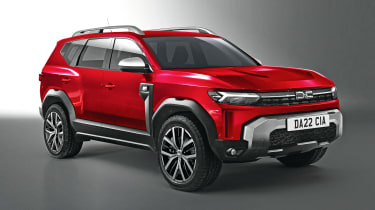
- Due: 2024
- Price: £20,000 (est)
- Engine: 1.6-litre 4cyl, 138bhp
Dacia’s move into the seven-seat SUV segment will give buyers a very competitively priced alternative. Expect chunky looks, possible hybrid power and prices from around £20k when the Bigster goes on sale in 2024.
Figures
| Kia Sorento 2.2D auto 3 | VW Tiguan Allspace 2.0 TDI 4MOTION Elegance | |
| On the road price/total as tested | £43,020/£43,680 | £43,135/£45,170 |
| Residual value (after 3yrs/36,000) | £24,182/56.2% | £22,810/52.9% |
| Depreciation | £18,838 | £20,325 |
| Annual tax liability std/higher rate | £3,109/£6,219 | £3,118/£6,236 |
| Annual fuel cost (12k/20k miles) | £2,774/£4,624 | £2,311/£3,852 |
| Insurance group/quote/VED | 31/£592/£520 | 23/£523/£520 |
| Cost of 1st/2nd/3rd service | £12pm (3 years) | £16pm (2 years) |
| Length/wheelbase | 4,810/2,815mm | 4,728/2,789mm |
| Height/width | 1,700/1,900mm | 1,685/1,829mm |
| Engine | 4cyl in-line/2,151cc | 4 cyl in-line/1,968cc |
| Peak power/revs | 199/3,800 bhp/rpm | 148/3,500 bhp/rpm |
| Peak torque/revs | 440/1,750 Nm/rpm | 360/1,600 Nm/rpm |
| Transmission | 8-spd auto/4WD | 7-spd auto/4WD |
| Fuel tank capacity/spare wheel | 67 litres/repair kit | 58 litres/£235 |
| Boot capacity (7/5/2 seat modes) | 187/616/2,011 litres | 230/700/1,775 litres |
| Kerbweight/payload/towing weight | 1,954/646/2,500kg | 1,834/741/2,500kg |
| Turning circle | 11.6 metres | 11.9 metres |
| Basic warranty (miles)/recovery | 7yrs (100,000)/1yr | 3yrs (60,000)/1yr |
| Driver Power manufacturer/dealer pos | 2nd/3rd | 17th/16th |
| NCAP: Adult/child/ped./assist/stars | 82/85/63/87/5 (’20) | 96/84/72/68/5* (’16) |
| 0-62mph/top speed | 9.1 secs/127mph | 9.7 secs/122mph |
| Auto Express economy/range | 34.9/7.7/514 miles | 41.9/9.2/535 miles |
| WLTP combined | 42.2mpg | 42.8mpg |
| WLTP combined | 9.3mpl | 9.4mpl |
| Actual/claimed CO2/tax bracket | 217/176g/km/37% | 181/173g/km/37% |
| Airbags/Isofix/parking sensors/camera | Yes/yes/F&R/yes | Yes/two/f&r/yes |
| Auto box/lane keep/blindspot/AEB | Yes/yes/yes/yes | Yes/yes/yes/yes |
| Climate control/cruise control | Yes/adaptive | Yes/adaptive |
| Leather/heated seats | Yes/four | £1,985/two |
| Metallic paint/LED lights | £660/yes | £780/yes |
| Keyless entry & go/power tailgate | Yes/yes | Yes/yes |
| Sat-nav/digital dashboard | Yes/yes | Yes/yes |
| DAB radio/connected services | Yes/yes | Yes/yes |
| Wireless charge/CarPlay/Android Auto | Yes/yes/yes | Yes/wireless/wireless |
